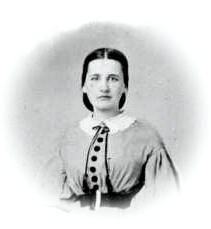June 11th, 1861.—Perhaps it would be as well, my dear Diary, to write here a short sketch of the Bradford neighborhood at this time. The war is an established fact and a shadow lies across the hearts of the Southern people. It may be that the North feels it equally with ourselves, but I cannot think so. This is the reason why. We did not want this war. It rested entirely with the North whether it should be WAR or PEACE. We wanted peace but war was forced upon us and now that it has begun we will do our best to win. May The God of Battles help us.
Coming southward from the Georgia line you reach the Bradford neighborhood at Pine Hill Plantation, the home of Dr. Edward Bradford. He has no sons, only daughters, but he has three sons-in-law in the army. The next place is Oaklawn, the home of Captain William H. Lester. The Captain’s head is white, he gained his title in the Indian War but he has three sons and a son-in-law in the army. Then comes Greenwood, where Dr. Holland lives with a house full of daughters. His only son was among the first to volunteer and he also has a son-in-law in the service. Mr. Thomas A. Bradford comes next. Walnut Hill Plantation lost its mistress some years ago and the affairs of the household are administered by four beautiful and capable daughters. There are three sons also and these are in the Confederate army, as well as a son-in-law, who had won the fifth daughter from the old home. Water Oak Plantation is the home of the youngest of the Bradford brothers. He has four sons in the army.
This completes the entire number of men eligible for military duty and you see no one is shirking this duty. While the men have gone forth to meet the foe the women are not idle. The blockade established by President Lincoln has cut us off entirely from the rest of the world; we must depend upon our own resources and we are trying to utilize them all. Father says we never know what can be done until we are pushed to the wall and that is just where we are finding ourselves now. And this is only the beginning.
So far we have plenty of cloth for some purposes but uniforms are more necessary than anything else at present and no suitable material can be had. Of course the men of wealth can and do, buy up all in reach, but there are so many hundreds who must be clothed. The factories of North Georgia and Alabama are running day and night, turning out “Butter-nut Jeans” from which the women all over the South are fashioning uniforms. We are knitting socks, too, for they are needed; the dainty hosiery of pre-war days will not stand the necessarily hard usage of camp life. I learned to knit when I was quite small and now I am very glad of it; we try to see who can complete a pair of socks in the shortest space of time.
Susan Bradford is 15 years old when this entry was made.
